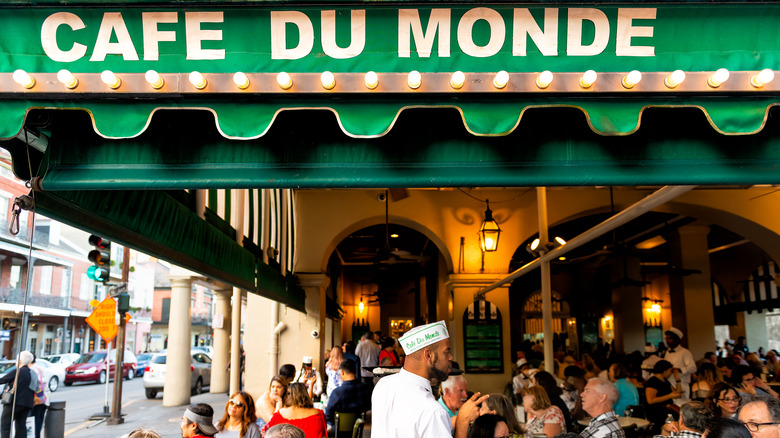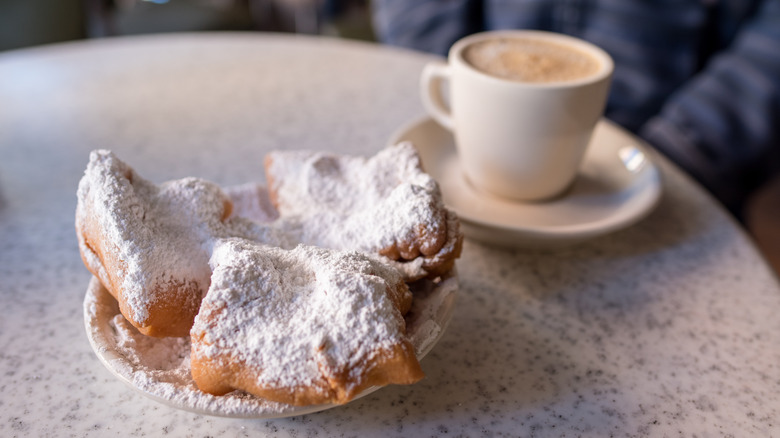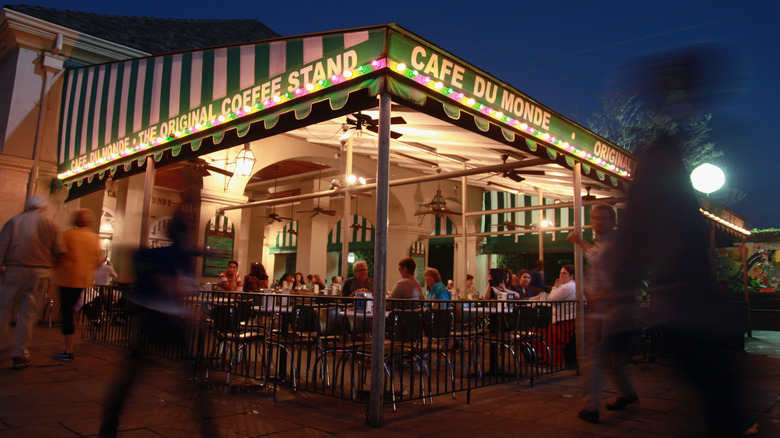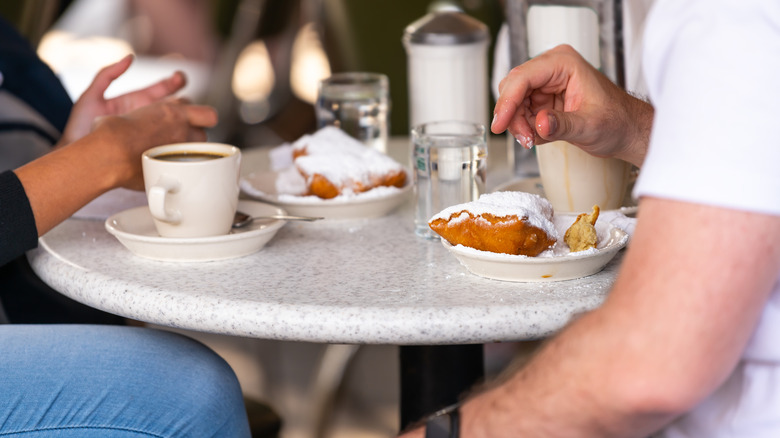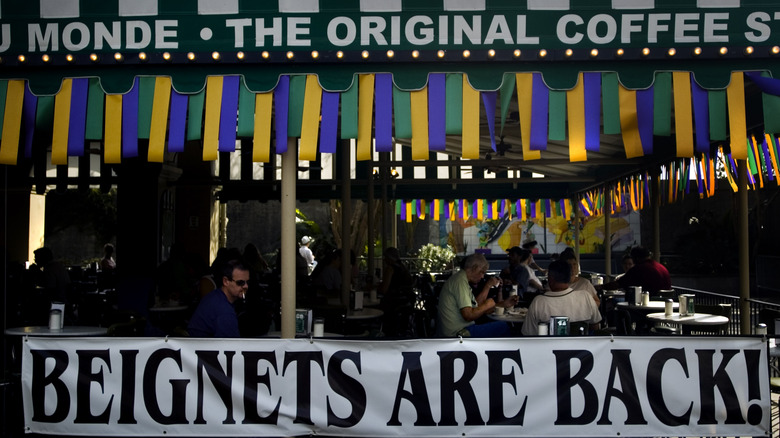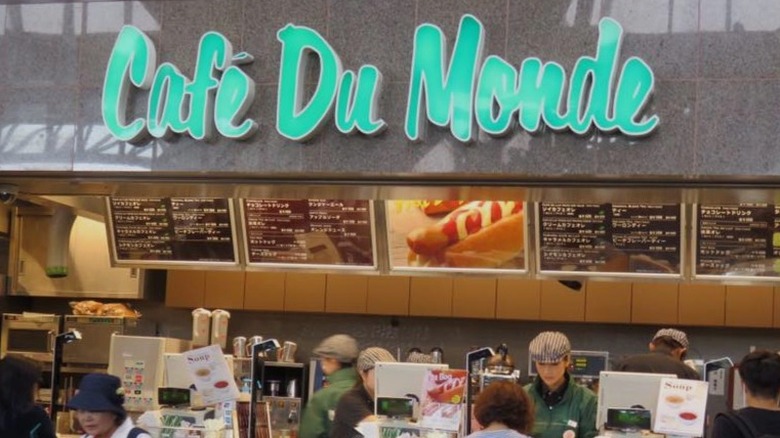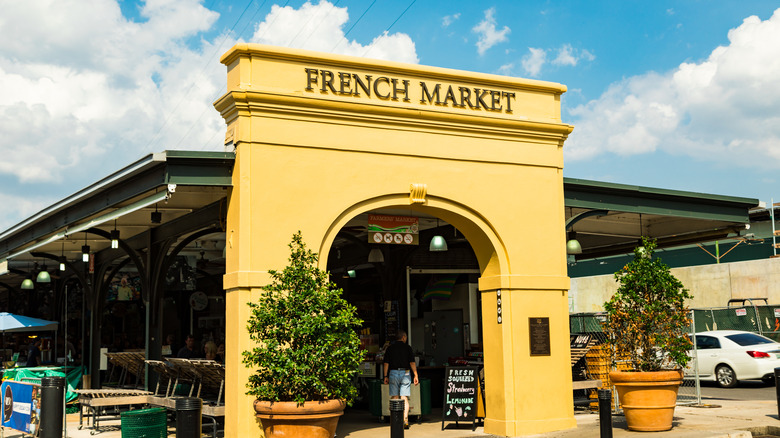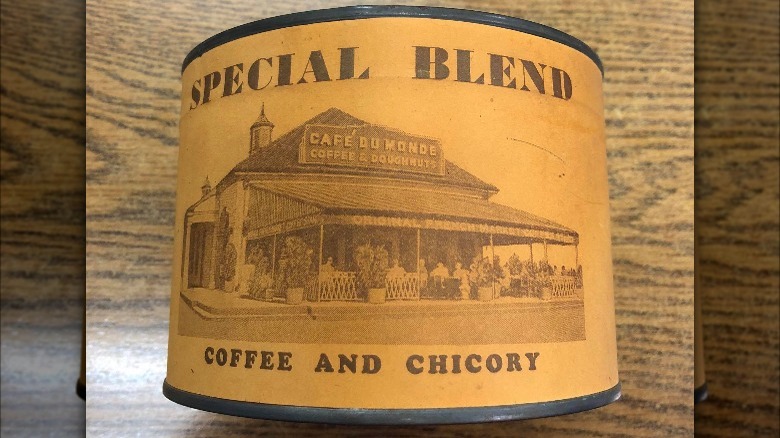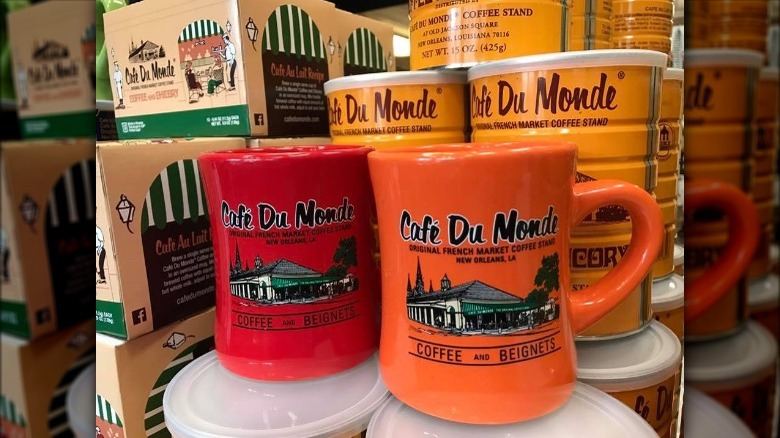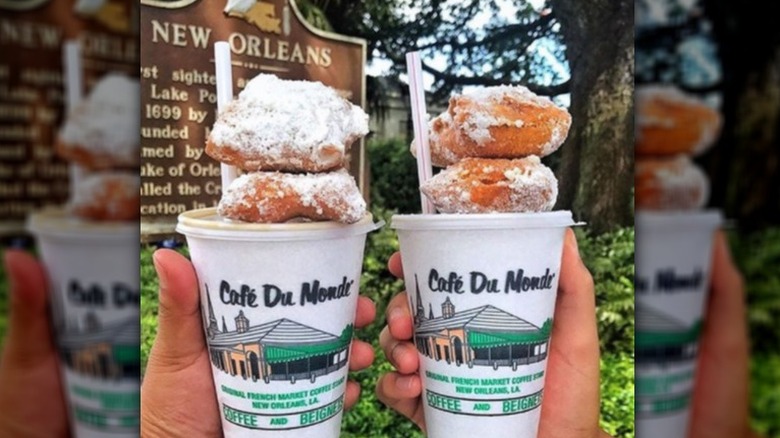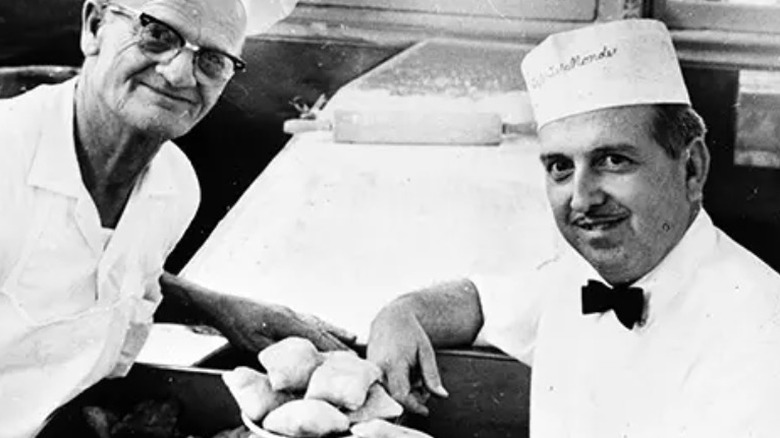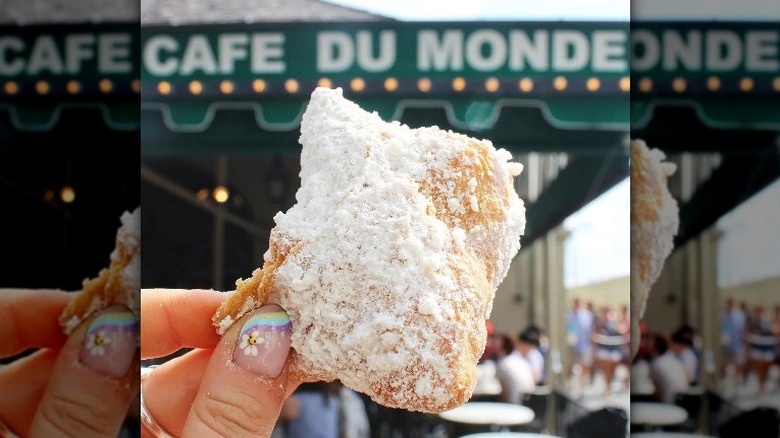The Untold Truth Of Café Du Monde
As one of the most famous restaurants in America, Café Du Monde is well known for its traditional and simple offerings of powdered sugar-topped beignets and chicory root coffee. It's a fair question to debate whether Café Du Monde should be classified as a breakfast restaurant or a hotspot for dessert, but one thing is for certain: After 160 years in business, the restaurant has developed a cult following. Café Du Monde is widely known as a New Orleans institution, and one of several must-visit spots on any tour through the city.
While Café Du Monde has long-cemented its place as a storied New Orleans establishment, the grainier details about the cafe's history are often skipped over in conversation. After all, it's hard to discuss any specific details when your mouth is full of soft and decadent French-style donuts. But when it comes down to it, the untold truth of Café Du Monde is every bit as delicious as the food and beverages that are served there. If you're hungry to know more, then grab yourself a steaming cup of coffee and keep reading about this storied coffee shop.
There is only one food item on the menu at Café Du Monde
If you've never tried a beignet before, Café Du Monde would certainly be the place to start. In fact, visit the café with a craving for something other than delectable French-style donuts coated in mounds of sugar and you may just leave hungry. While the beverage menu at Café Du Monde is a short, concise list of refreshing and revitalizing drinks (think orange juice, hot chocolate, or the regional treat, café au lait), the food menu is even smaller; beignets are the only grub that can be found at Café Du Monde.
Café Du Monde considers itself a traditional coffee house. As such, rather than presenting a sprawling, all-day menu full of various food and beverage offerings common in our modern food scene, the café recalls an older time — one where people went to their local shops to simply drink some coffee. By staying true to that purpose, Café Du Monde has remained one of the best coffee shops around. And as long as you don't go in expecting a full-fledged meal with your chicory coffee, you'll soon understand the allure.
Of course, if you're visiting this New Orleans institution, chances are you're going for the powder-topped donuts anyways. As Café Du Monde president Jay Roman put it, coffee and beignets are what has kept the stand in business for 160 years, and that is a legacy worth protecting (via NOLA.com).
Café Du Monde is always open
An outsider might look at Café Du Monde, with it's menu featuring coffee and pastries (and not much else), and reasonably assume it was a popular breakfast spot — which is true. But as insiders know, that's because Café Du Monde is popular at any time of the day, or night for that matter. After you've wrapped up a night out on Bourbon Street and find yourself desperately in need of something to sop up all the Sazeracs floating in your belly, Café Du Monde is always there to support you.
And when we say always, we mean it. At Café Du Monde, the lights rarely go out. The beignet stand is pretty much open 24 hours a day, seven days a week. Whether you're craving a beignet for breakfast or an after-dinner treat, the French Quarter location delivers. But there are a few notable exceptions to keep in mind. Christmas is the one day a year you'll find the cafe closed. And hurricanes have also been known to shut down the cafe — so if you're visiting New Orleans in the summer and craving beignets, make sure to keep an eye on the weather.
It is a tourist trap still beloved by locals
When you live in a city that has a heavy seasonal influx of visitors, it can be easy to write off popular itinerary stops as tourist traps. Such places garner a legendary "must visit" designation with travelers, while earning a "strictly avoid" status among locals. That's especially true when the destination in question extorts sightseers with wickedly higher prices. Perhaps it is the cheap fare; more likely it's because of the ways Café Du Monde has buoyed the city through tough times; or maybe it's because the beignets are just that good. Whatever the reason, Café Du Monde sits in the rare position of being loved by both tourists and locals alike.
Comments from a thread in the locals-only New Orleans Reddit page show just how treasured this place is for residents. One user went so far as to say that hating Café Du Monde was akin to hating New Orleans Saints legend Drew Brees. If you know anything about this famously hospitable city, then you know that speaking ill of Brees runs you the risk of being served cold gumbo, soggy po'boy, or a weak drink. Café Du Monde may draw large crowds, but the prices have remained fair, even as demand has increased over decades. Plus, the pastry is consistently slamming, so locals keep a soft spot in their hearts for this place — and make the most of the 24/7 schedule to avoid the throngs of tourists.
Café Du Monde is a proud New Orleans symbol
When talking about hurricanes and New Orleans, it is impossible not to consider the most severe storm the city has weathered. On August 29, 2005, Hurricane Katrina ravaged New Orleans (via The History Channel). Nearly two decades later, the effects of this traumatic natural disaster can still be seen in neighborhoods across the city and felt in the psyche of locals. Recovery is a long and painful process that is hard to quantify, though there are some important markers which help signal the return of the city's former vibrance. And when things are looking down in the Crescent City, Café Du Monde has been a beacon of hope that sweeter days are ahead.
In the early aftermath of Katrina, the reopening of the Café Du Monde served as a signal that New Orleans could, and would, rebuild. At the time, the cafe had been closed for nearly two months, from August 27 to October 19, 2005. When the doors opened, locals rushed to visit, devouring steaming piles of pillowy comfort food and fortifying their resolve to put their best foot forward. In more recent times, Café Du Monde has continued its role as a recovery benchmark. After shutting down during the coronavirus pandemic, local journalists hailed the cafe's reopening as a sign that New Orleans had once again returned from the brink of trying times.
Café Du Monde is only in Louisiana and Japan
Considered a descendent of French pastry styles, beignets are an iconic Cajun food. As such, Café Du Monde is a Louisiana delicacy through and through. And true to that title, Louisiana is the only place you will find a Café Du Monde location — within the United States, at least. Across the world, Japan is the only other place where Café Du Monde stands operate.
The business partnership began after Louisiana hosted the World Exposition of 1984, reports NOLA.com. Attracted by the history of beignets, and with a particular interest in New Orleans culture, a large Japanese conglomerate approached the family behind Café Du Monde. After a lengthy process of low-key meetings, which company president Jay Roman described as "50 first dates," they asked for the opportunity to license the cafe, and the rest is history. Now, 21 Café Du Monde locations can be found in Japan. So if you're hungry for these famous beignets, you can book a plane ticket for New Orleans — or Kyoto.
The cafe's original home actually has Spanish roots
With locations in Japan and Louisiana, you might say that Café Du Monde is a pretty worldly business. And incredibly, the building that houses the original Café Du Monde, known as the French Market, has a history which further boosts its global status.
New Orleans has been governed or influenced by several different countries throughout its history. The most prominent was France, which founded the city around 1718 (per The History Channel). But starting in the 1770s, the Spanish exercised a brief period of governance over New Orleans. During this period of Spanish rule, the first French Market building was constructed (though it probably wasn't called this by the Spanish).
Although the building initially housed New Orleans' first open-air food market, it would go on to be the future home of Café Du Monde — but not without a proper christening. In typical southern Louisiana fashion, a hurricane destroyed the original structure in 1812. Back under French rule by then, the city constructed a new, more permanent building the following year — the same building which exists today. The French Market was born, and with it an enduring spot for arguably the world's best beignets.
Café Du Monde's coffee was born out of necessity
Café Du Monde is probably best known for deliciously decadent pastry, but that isn't all that people go for. The cafe also draws customers who come for its unique coffee. At Café Du Monde, the java beans are blended with chicory root, which comes from endive plants (via Inside Travel Lab). Chicory adds an earthy flavor profile to the dark roast coffee. Plus, the mix is a great hack for cutting caffeine from your diet. But while chicory may now be a Café Du Monde classic, and a New Orleans staple, history shows that preference wasn't the initial reason this tradition came about.
As one of the oldest coffee shops in the world, Café Du Monde's unique chicory coffee goes back nearly two centuries. As Unique Nola Tours explains, Louisianans began adding chicory to their coffee during the American Civil War. At the time, Union troops had formed a blockade around the port of New Orleans, preventing commodity goods like coffee beans from getting in. Chicory, with its similar flavor profile, became an important, and cheap, way to stretch the supply. When the war ended, merchants continued mixing chicory and coffee in order to maximize coffee profits. And somewhere along the way, people grew accustomed to this distinctly New Orleans-style drink.
The signature coffee is popular in Asian grocery stores
Café Du Monde's chicory-blended coffee is a New Orleans' classic, enjoyed by locals and tourists alike. But over the last few decades it's also become an important staple in the Vietnamese American community.
According to Nguyen Coffee Supplies, chicory coffee is close in taste to robusta coffee — the sister plant to the more widely popular arabica variety. It is widely consumed in Vietnam, which is the world's largest producer of robusta coffee beans. Robusta is the key ingredient in types of coffee like cà phê sữa đá and Vietnamese egg coffee. When the Vietnamese diaspora began in the 1970s, immigrants arriving across the American South found refuge in the flavor similarities between chicory coffee and robusta coffee. And the taste of Café Du Monde's coffee in particular made for a good substitute for the coffee they were used to drinking at home. Word spread throughout the Vietnamese community all over the country, and today, Café Du Monde's coffee is a popular item to find in Asian supermarkets, as well as Vietnamese restaurants and cafes.
Jimmy Buffett once sang about Café Du Monde
Have you ever come across a food that is so good you feel like you have to express it in a creative way? Many have been known to do a happy dance in their seats when the food really slaps. Sometimes though, dancing isn't enough. When you come across a particular snack or meal that's good enough to make you sing, you know you've hit something special. Just ask Jimmy Buffett, who wrote about Café Du Monde's piping hot pastries and stiff coffee in his song, "The Wino and I Know."
As Jimmy knows, "coffee is strong at the Café Du Monde," and "donuts are too hot to touch." And after a night out on Bourbon Street, there is nothing more pleasant than "those sweet goodies" that he's sure to eat too much of every time. While we might not be able to sing about fresh beignets as smoothly as Mr. Buffett, we can confidently say that we'd take hot New Orleans donuts over a cheeseburger in paradise (or Margaritaville) any day of the week.
At Café Du Monde, it's all in the family
Citizens of New Orleans may have a particularly strong dedication to their hometown beignet stand, but there is no one that has more love for Café Du Monde than the Fernandez family. The founder of Café Du Monde, Fred Koeniger, started the business in the French Market in 1862. After 60 years, the business was sold to Hubert Fernandez in 1942. At the time, Fernandez owned a namesake wine shop across the street, which he eventually closed in order to focus on Café Du Monde full-time.
These days, Café Du Monde is still a family affair. The current company president, Jim Roman, is a third-generation Fernandez. He credits that legacy as one of the reasons the business remains successful today (via Yahoo). And the family has no plans to change things anytime soon, gearing up to pass the business down to the fourth generation (via WDSU).
The beignet mix is certified kosher
In this day and age, it's not easy to make a food product that falls within the many spiritual, ethical, or dietary restrictions that make up America's diverse eating habits. So it's worth noting that since 2008, Café Du Monde has been creating dreamy donuts that make the cut for a very large group of people and their religion-based food guidelines (via Buyoya). Thanks to the efforts of Rabbi Gabe Greenberg, the beignets at New Orleans's most famous cafe are certified kosher on a regular basis, making them a bona fide must-eat for any Jewish people observing kashrut law while visiting or living in New Orleans (via Tablet Magazine).
We know that Café Du Monde is fairly strict when it comes to the menu, but with any luck, the next generation of owners might see the importance of expanding to add donuts that meet vegan, gluten-free, or low-glycemic dietary standards. Here's to hoping — but for now, we'll take a standard order of three, please.
